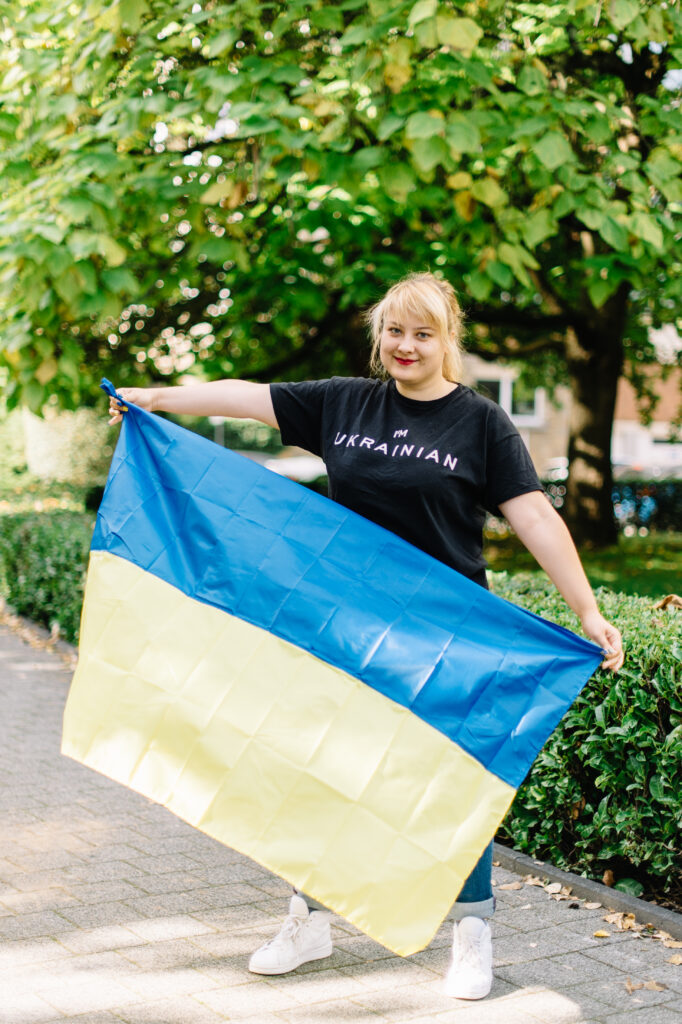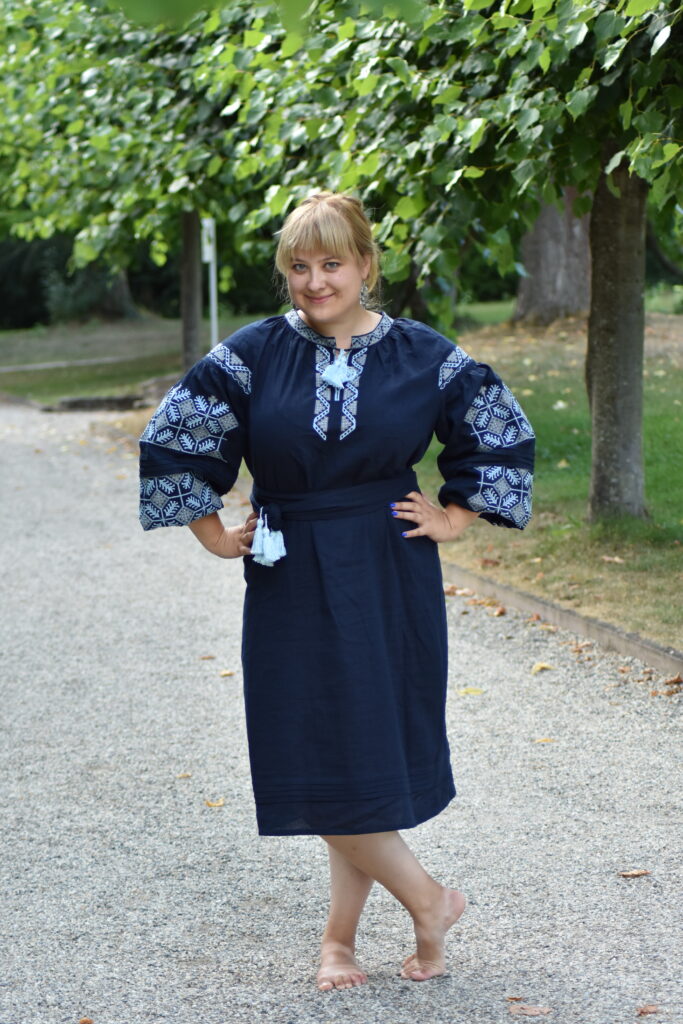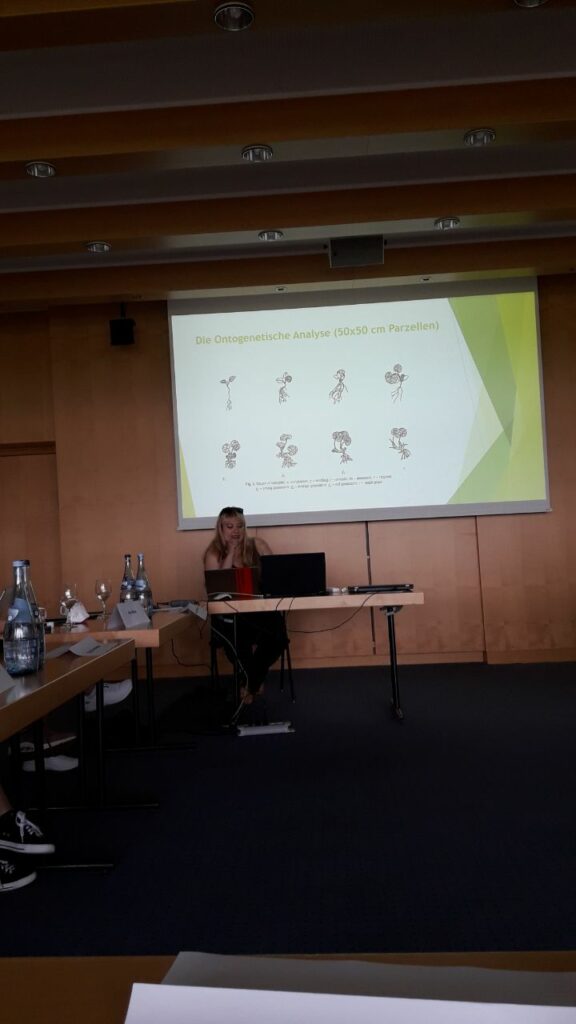
Connecting the dots of nature
Nataliia Yaroshenko is a PhD student and young researcher from Sumy, Ukraine, who is passionate about a range of STEM fields, though she has chosen to dive into ecology and geobotany. Besides her PhD topic, Nataliia studies how the Russian invasion affects ecosystems in Ukraine and Europe. To raise awareness about the ecological repercussions of the war, Nataliia and her team have created a comic, “enWAR_mental”, highlighting the ecocide as one of the consequences of the full-scale invasion.
Nataliia’s ‘STEM Story’ is one of a series of interviews with promising female professionals in science and technology, who want to share their experiences and motivate young girls to choose a STEM career.

1. Could you please tell us more about your major – what do you study? What is the biggest success that you have achieved so far?
Since childhood, I have been interested in natural sciences – biology, physics, and astronomy… So I graduated from several specialties at various Ukrainian universities. Still, in graduate school, I settled on Her Majesty, Ecology, a science that explains many relationships and interpretations in the coexistence of living organisms. What attracts me the most is the opportunity to search and eventually find these relationships, feeling like a pioneer, which is the priority of ecology as a science.
Currently, I am a graduate student at the Sumy National Agrarian University, where I study population analysis of plants and, in simple words, how plants at the level of groups react to changes in the environment. However, with the beginning of the full-scale invasion, the base of my studies had to change – from Sumy Oblast to Göttingen Forest, located in Lower Saxony, Germany. To do this in the 2nd year of writing my thesis, when not only my preparatory work had been done, but also the first field season with the collection and analysis of plants, is frankly not the most straightforward task. Despite everything, I consider the fact that I started working on a dissertation “from scratch” on the territory of Germany using exclusively Ukrainian developments, as a remarkable personal achievement.
What I like most is the freedom to manage my research project, but you can ask for advice or comments if necessary. It is important. Freedom in research directly affects your development not only as a scientist but also as a person.
2. How and when did you become interested in a career in STEM? Why did you eventually choose this particular field?
I have been interested in natural sciences since childhood – starting with school Olympiads, numerous all-Ukrainian competitions, and many others that filled my school life. My family is made up entirely of farmers, and we would spend every weekend in complete contact with the soil and domestic animals. Step by step, my family nurtured my attitude toward nature and all living things surrounding us during joint family work trips. This would become the most important influence when choosing my future profession.
Ecology is the final result of my STEM research. One thing became clear from studying at university: my guilty pleasure lies in geobotany, because it connects plants with their growth conditions, answers numerous questions, and establishes many connections. If botany is the science of plants, geobotany is like a sandwich. When you “spread” eco-factors on the empirical data of floristic studies, add analysis and conclude – does the sandwich taste good? I am majoring in plant ecology, which further expands my horizons in the impact of logging on the populations of certain flora species.

3. Have you ever experienced gender inequality or gender-based stereotypes during your studies or career?
At university, I wasn’t chosen as the head of the group because I am a girl. A guy always had to be the first to enter the exam room, because of some superstition that if a girl went in first, the exam would be unsuccessful for the whole group. At that time, we took it for granted, laughing, until I became a junior research assistant at one of the Ukrainian museums. Every man who worked in this institution felt the need to say that the “science of butterflies and plants” belongs to the consciously feminine and that no ordinary man would voluntarily agree to such a speciality. My colleagues and I never discovered what a “normal man” meant to them…
I’m just learning to react to such stereotypes, but I’m trying to put together my “bag of arguments” to strengthen the small talk about the place of women in science. However, the arguments in your head, which relate to your speciality and are supported by clear facts, will not leave your interlocutors indifferent.
4. Why is promoting STEM disciplines, particularly among girls, an important priority for the EU and Ukraine?
STEM contributes to the development of cross-sectoral interaction between Ukraine and the EU. In particular, positive changes in this direction will contribute to the unification and systematisation of specific databases, significantly simplifying cooperation between universities. The active involvement of girls in STEM disciplines in Ukraine is a decisive step in promoting the strengthening of women scientists and their fight against sexism in the European community. Such a signal can be an impetus for the broader involvement of girls of all ages in the STEM community, expand cooperation at the national and international levels, and help to strengthen the status of female scientists as something completely normal.

5. Are there any female scientists who inspire you? Why are they so special?
It always felt the Bible’s warning against “creating an idol” was a good quote and a manifesto that helps to arrange one’s guidelines in career, education, and personal life. Thus I do not have any. However, there is a woman scientist who I am very proud to work with, and I appreciate her as a specialist.
I met my scientific supervisor at graduate school while looking for a promising direction of research, which was to turn into a future Ph.D. thesis. Having met with several potential candidates, I once again concluded that the university’s prestige does not play a key role because scientific cooperation is based on joint work in the “person-to-person” format. And the search was worthwhile.
A multitasking person – this is how you can describe my scientific supervisor Viktoriia H. Skliar, who, in addition to managing post-graduate students, holds the position of head of the department, manages several national and international projects, manages to join the work of several scientific societies and helps with the promotion of student projects on various scientific platforms. And she always finds time to discuss current events, and is always human. And the last is the most valuable in these stormy times.
6. What advice would you give to girls who are only considering entering STEM disciplines?
Focus on what you enjoy. Think, research, and take your time – these rules allow you to become successful scientists and researchers of the universe.
To achieve success, it is essential to define priorities and directions. You may be interested in astronomy, physics, and mathematics, but it is impossible to cover everything. Listen to what interests you more. Feel free to try everything and try it all at once. Your priority is what will give you wings and what you will find time for despite fatigue.
We often do many other things and “taste” even more, but in the end, we find ourselves on a ship that takes us to our leading destination – the real us. Authenticity is achieved through endurance, love, and desire, which are faithful assistants in becoming a scientist of the 21st century.
You make your choice and you fight against stereotypes, for which you should be ready. But you can because you and your girl’s power are incredible!
LATEST

How you can help the planet every day

Building Europe: Poland’s experience of joining the European Union and lessons for Ukraine

World Health Day 2024: My Health, My Right

EUREKA MEETS EUROPE – opportunities to develop and study. My experience

Can you wear pink in the workplace?
More campaign pages:
Interested in the latest news and opportunities?
This website is managed by the EU-funded Regional Communication Programme for the Eastern Neighbourhood ('EU NEIGHBOURS east’), which complements and supports the communication of the Delegations of the European Union in the Eastern partner countries, and works under the guidance of the European Commission’s Directorate-General for Neighbourhood Policy and Enlargement Negotiations, and the European External Action Service. EU NEIGHBOURS east is implemented by a GOPA PACE-led consortium. It is part of the larger Neighbourhood Communication Programme (2020-2024) for the EU's Eastern and Southern Neighbourhood, which also includes 'EU NEIGHBOURS south’ project that runs the EU Neighbours portal.

The information on this site is subject to a Disclaimer and Protection of personal data. © European Union,